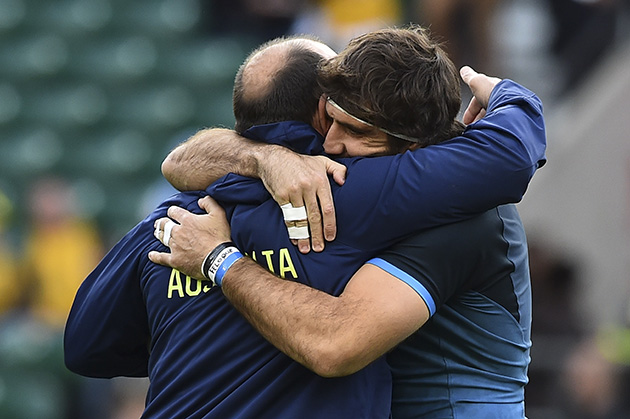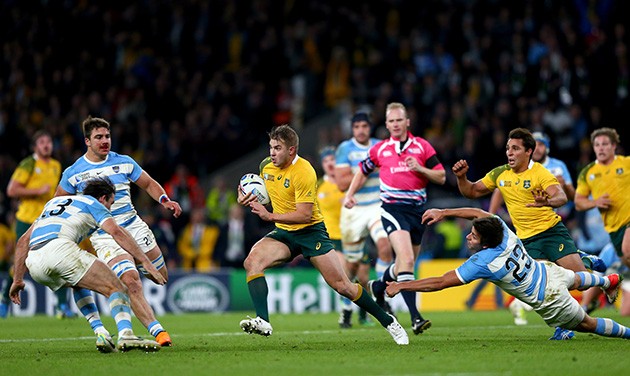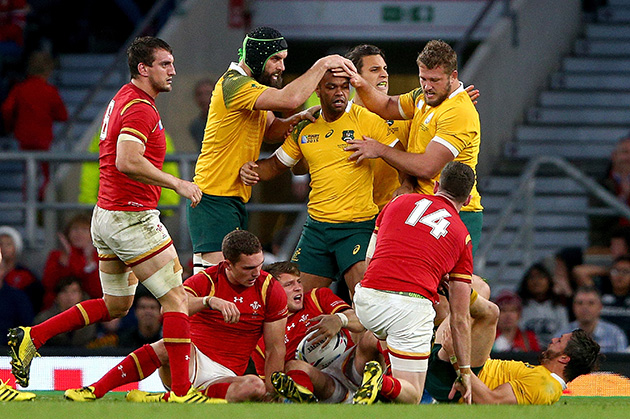After New Zealand and Australia booked their places in the 2015 World Cup final, we reflect on the semi-final action
All-round ability
In Cardiff a little over a week ago, New Zealand demonstrated just how lethal and creative their attacking game can be. They scored nine tries against France, offloads here, sidesteps there and Julian Savea simply bulldozing his way over the French defence! At Twickenham this weekend, it was the All Blacks’ defence and tactical kicking that was to the forefront against South Africa. The Springboks never looked close to breaking down the black wall and scoring a try while the range of kicks produced by Dan Carter & Co was impressive.
Then look at Australia. Against England they ran the show, attacking from all over. Against Wales, their defence, particularly when down to 13 men, was the key. Against Argentina, they were clinical in attack and scrambled superbly in defence to deny the Pumas a try. Special mention must be made of Scott Fardy, the unsung workhorse in the Wallaby back row, and David Pocock, who won twice as many turnovers as any other player in that match.
Both the Wallabies and the All Blacks have shown the ability to win games in different ways, the possession of a Plan A, B and C. Wallaby coach Michael Cheika calls it showing “a different skin”; Steve Hansen says good games can look different. The question now is which style will come out on top on Saturday afternoon in the final? If they both show a little bit of everything, it should be a heck of a match and could go right down to the wire.
It’s also worth saying that Argentina now have a more rounded game, their willingness to run the ball rather than relying on their forward power obvious throughout 2015 – they just weren’t as clinical as Australia in their semi-final. It’s a style they seem determined to stick with and it should reap rewards in the coming years – and maybe on Friday night against South Africa in the third-place play-off.
Softly-softly approach
Let’s preface this point by saying that player safety should be the priority in rugby. However, the sin-binning of Tomas Lavanini for a no-arms tackle on Israel Folau on Sunday afternoon should not have been deemed dangerous. It may have been a penalty but the yellow card was too much. Watch it in real time and there was little in it.
Juan Martin Fernandez Lobbe said afterwards that it’s simply the way Lavanini tackles while Scotland flanker Ally Strokosch tweeted: “No tip tackles, no chop tackles. Soon there’ll be no tackles. These idiots are ruining the game.”
Doing it the hard way
If Australia go on to win this World Cup, they will have beaten six of the world’s top ten teams – a quite incredible effort. They were drawn in the same pool as three of them – England, Fiji and Wales – and, as we’ve said before, World Rugby should make future pool draws later to ensure that situation doesn’t happen again.
They have then overcome Scotland and Argentina in the knockout stages, with New Zealand the sixth hurdle they have to overcome. It’s the hardest route anyone’s ever had to take to the final and should they triumph, you could say they will be the most deserving of winners.
The power of social media
On Saturday night, pockets of rugby fans gathered around their phones to look at a Vine clip of Richie McCaw colliding with Francois Louw during New Zealand’s win over South Africa. Had the All Blacks captain elbowed the Springbok? The following day’s papers ran stories about how rugby’s most-capped player could miss the World Cup final.
Then more clips emerged that suggested it was McCaw’s hip that had connected with Louw’s shoulder while South Africa’s doctor confirmed that the forehead cut that required 20 stretches had occurred during a lineout, not the ruck in question. Subsequently the citing officer confirmed there would be no further action. Quite amazing how one incident can snowball, grow arms and legs, purely because of social media. It created a story out of a non-story.
The emotion of sport
One particular scene stood out at the end of Argentina-Australia. Mario Ledesma, Argentina’s most-capped hooker who is now in charge of Australia’s scrum, would clearly have had mixed emotions about this fixture and was magnanimous in victory. At the final whistle, he took the time to console his fellow countrymen and particularly those he once played alongside.

Good friends: Mario Ledesma and Juan Martin Fernandez Lobbe hug before the game. Photo: Getty Images
The most poignant moment of all came when he shared a lengthy hug with Juan Martin Fernandez Lobbe, a man who knows he will never have another chance to win a World Cup as a player and someone who emptied the tank in this encounter with the Wallabies. The two had also embraced before kick-off. They may have been on opposite sides but their sporting bond was unmistakable.
For the latest Rugby World subscription offers, click here.









